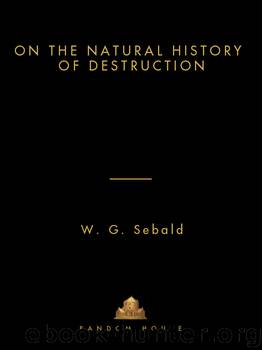On the Natural History of Destruction by W.G. Sebald

Author:W.G. Sebald [Sebald, W. G.]
Language: eng
Format: epub, azw3
ISBN: 978-1-58836-276-6
Publisher: Random House Publishing Group
Published: 2012-01-10T16:00:00+00:00
*Approximately, “for a cozy get-together.”
* Well-known postwar group of German writers and artists.
*Referring to the great Germanic hero Hermann of the Cherusci (Latin: Arminius), who defeated the Romans at the battle of the Teutoburger Wald in A.D. 9.
Between the Devil and the Deep Blue Sea
On Alfred Andersch
IN ALFRED ANDERSCH, GERMAN LITERATURE HAS DISCOVERED ONE OF ITS SOUNDEST AND MOST INDIVIDUAL TALENTS.
Alfred Andersch, book jacket text written by himself
The novelist Alfred Andersch lacked neither success nor failure in his lifetime. Until 1958, the year of his “emigration” to Switzerland, he occupied a key position in the emergent literary world of the Federal Republic of Germany as a senior editor in radio, initiator of the influential journal Texte & Zeichen (“Texts & Signs”), and Germany’s leading feature writer (as he described himself to his mother).1 Later, partly for programmatic reasons, partly involuntarily, he moved further and further away from the mainstream. On the one hand, concepts of the peripheral, of separation, of withdrawal and disengagement largely determined the image of himself developed and circulated by Andersch; on the other, that image hardly altered the fact that, as the biographical material now available shows, he was actually more eager for success and more dependent on it than other prominent authors of the postwar period. It is clear from his letters to his mother that his opinion of his own work was far from restrained. “The Jünger broadcast will be a small sensation”; the play about anti-Semitism on which he claims to be working in 1950 is “the best thing on which I have ever embarked … far better than Friedrich Wolf’s Professor Mamlock”;* in Munich, Andersch sees himself “very much the coming man”; his publisher is going to “hold a big reception” at the Frankfurt Book Fair to mark the publication of his novel Sansibar (“Zanzibar”), on which, moreover, as he does not fail to inform his mother in the same letter, Professor Muschg, “the most eminent among our literary historians … [has] delivered a wonderfully positive verdict.” Then Andersch is “in the middle of working on a great radio play,” is writing “a great new story,” or has “finished a great broadcast.” And when Ein Liebhaber des Halbschattens (“A Lover of the Half-Shade”) is serialized in the Neue Zürcher Zeitung, Mama is informed that “this exclusive paper … [accepts] only the very best.”2 Such statements are typical not only of the compulsive self-justification governing Andersch’s relationship with his mother, but also of his own yearning for success and public acclaim, which is in striking contrast to the idea of private, anonymous heroism that, as one of the so-called internal emigrants, he likes to advocate in his books. “Great,” in any event, is the operative word in Andersch’s assessment and presentation of himself. He wanted to be a great writer writing great works, attending great receptions, and on such occasions casting all the competition as far into the shade as he could, for instance in Milan, “where Mondadori,” writes Andersch in an account
Download
On the Natural History of Destruction by W.G. Sebald.azw3
This site does not store any files on its server. We only index and link to content provided by other sites. Please contact the content providers to delete copyright contents if any and email us, we'll remove relevant links or contents immediately.
Whiskies Galore by Ian Buxton(41949)
Introduction to Aircraft Design (Cambridge Aerospace Series) by John P. Fielding(33097)
Rewire Your Anxious Brain by Catherine M. Pittman(18598)
Craft Beer for the Homebrewer by Michael Agnew(18205)
Cat's cradle by Kurt Vonnegut(15273)
Sapiens: A Brief History of Humankind by Yuval Noah Harari(14330)
Leonardo da Vinci by Walter Isaacson(13248)
The Tidewater Tales by John Barth(12634)
Thinking, Fast and Slow by Kahneman Daniel(12174)
Underground: A Human History of the Worlds Beneath Our Feet by Will Hunt(12058)
The Radium Girls by Kate Moore(11985)
The Art of Thinking Clearly by Rolf Dobelli(10343)
Mindhunter: Inside the FBI's Elite Serial Crime Unit by John E. Douglas & Mark Olshaker(9270)
A Journey Through Charms and Defence Against the Dark Arts (Harry Potter: A Journey Throughâ¦) by Pottermore Publishing(9252)
Tools of Titans by Timothy Ferriss(8322)
Wonder by R. J. Palacio(8068)
Turbulence by E. J. Noyes(7991)
Change Your Questions, Change Your Life by Marilee Adams(7697)
Nudge - Improving Decisions about Health, Wealth, and Happiness by Thaler Sunstein(7669)
